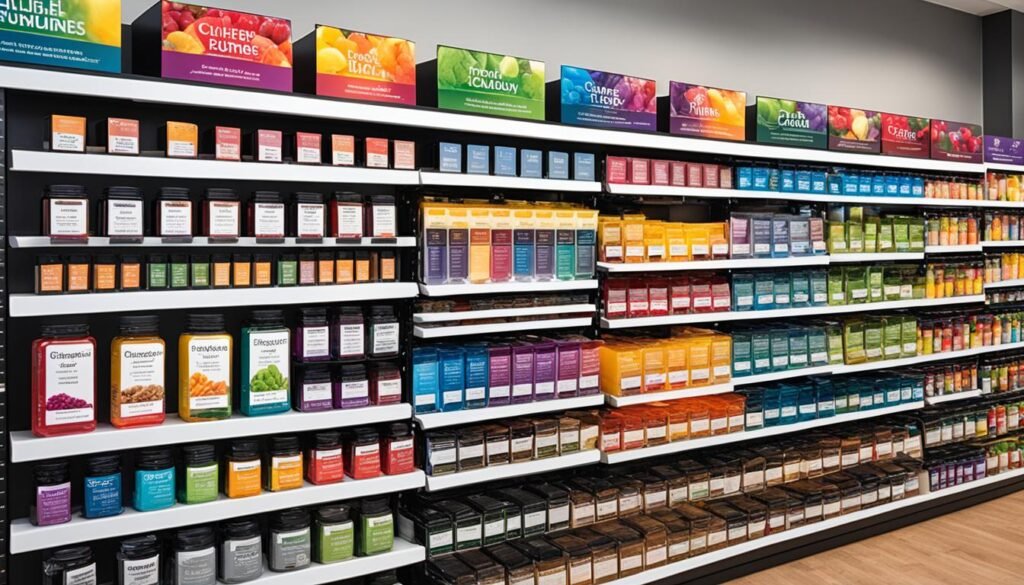Keeping your digestive system healthy is key to feeling good overall. Fiber supplements are a popular choice for those who find it hard to get enough fiber from food. They help support your digestive health easily. We’ll look at the top 10 fiber supplements that can make your digestion better and keep your gut healthy.
Key Takeaways
- Fiber is vital for a healthy digestive system. It helps with regular bowel movements, prevents constipation, and keeps the gut microbiome balanced.
- There are different types of fiber, like soluble and insoluble. Each type has its own benefits for your digestive health.
- When picking a fiber supplement, think about the fiber source, how you take it, and how much you should take.
- Adding fiber supplements to your diet can help you get the fiber you need. It supports your digestive health overall.
- Always talk to a healthcare professional before starting any new supplements, especially if you have health issues.
Understanding Fiber and Its Role in Digestive Health
Fiber is key for a healthy digestive system. It’s often missed, but it’s vital for gut health and well-being. Fiber helps with bowel movements and supports good gut bacteria.
Types of Fiber and Their Benefits
There are two main types of fiber: soluble and insoluble. Soluble fiber dissolves in water, making a gel-like substance. This slows down nutrient absorption, helps control blood sugar, and lowers cholesterol. Insoluble fiber doesn’t dissolve in water. It adds bulk to stool, helping with regular bowel movements and preventing constipation.
- Soluble fiber: Helps regulate blood sugar, lowers cholesterol, and promotes feelings of fullness.
- Insoluble fiber: Adds bulk to the stool, promotes regular bowel movements, and prevents constipation.
Both soluble and insoluble fibers are crucial for a healthy digestive system. Finding the right balance between them is important for gut health.
Daily Fiber Requirements for Optimal Digestion
Adults need 25 to 30 grams of fiber daily. Most of this should come from foods like fruits, veggies, whole grains, and legumes. But many people don’t get enough fiber. That’s where fiber supplements come in, helping to support digestive health.
- Women should aim for 25 grams of fiber per day.
- Men should aim for 30 grams of fiber per day.
- Fiber supplements can help bridge the gap when dietary fiber intake is insufficient.
Knowing about fiber types and daily needs helps people support their digestive health and well-being.
The Importance of Fiber Supplements for Digestive Health
Keeping your digestive system healthy is key to feeling good overall. Fiber is a big part of this. Many people find it hard to get enough fiber from food. That’s where fiber supplements come in handy, making it easy to get more fiber and help your digestive health.
Fiber supplements are great because they help you go to the bathroom regularly and avoid constipation. They make your stool bulkier, which softens it and makes it easier to pass. This helps you feel better and can prevent bigger problems like hemorrhoids and diverticulitis.
These supplements also help control blood sugar and keep cholesterol levels healthy. Fiber slows down how fast carbs are absorbed and cuts down on cholesterol absorption. This helps prevent serious diseases like type 2 diabetes and heart disease.
“Fiber supplements are an essential tool for maintaining a healthy digestive system and promoting overall well-being. For individuals who struggle to meet their fiber needs through diet alone, these supplements can be a game-changer.”
Also, fiber supplements feed the good bacteria in your gut, which is key for a strong immune system and fighting inflammation. This can lower the risk of problems like IBS and IBD.
In short, fiber supplements are very important for your digestive health. If you’re dealing with constipation or want to boost your gut health, adding these supplements to your diet could really help. So, look into different fiber supplements and find the one that fits your needs best.
Factors to Consider When Choosing Fiber Supplements
When picking a fiber supplement, think about several key factors. This ensures you pick the right one for your digestive health. The source of the fiber, the format, and the dosage are all important. Each one affects how well and how right the supplement works for you.
Source of Fiber
The type of fiber in a supplement matters a lot. Supplements often use:
- Soluble fiber, like psyllium, methylcellulose, and inulin, which helps with bowel movements and gut health.
- Insoluble fiber, such as wheat bran or cellulose, which makes stool bulkier and helps with regular bowel movements.
- Combination fibers, mixing soluble and insoluble fibers for better digestive support.
Think about the fiber source and what your gut needs when picking a supplement.
Supplement Format and Dosage
Fiber supplements come in capsules, powders, and gummies. The type you pick affects how easy it is to use, how convenient it is, and your experience. The amount you should take also depends on the supplement and your fiber needs.
| Fiber Supplement Format | Potential Benefits | Potential Drawbacks |
|---|---|---|
| Capsules | Convenient, easy to swallow, discreet | May require taking multiple capsules to reach the desired fiber intake |
| Powders | Versatile, can be easily mixed into drinks or food | May have a gritty or chalky texture, require careful measurement |
| Gummies | Appealing taste, easy to incorporate into daily routine | May contain added sugars or other ingredients that some individuals may prefer to avoid |
Think about what you like, your lifestyle, and any diet rules you follow when choosing a fiber supplement format.

By looking at the fiber source and the format and dosage, you can find the best fiber supplement. This will help your digestive health and overall well-being.
fiber supplements digestive health
Fiber supplements are key for good digestive health. They help with regular bowel movements, reduce constipation, and keep the gut healthy. This makes them great for anyone looking to boost their digestive health.
These supplements add bulk to the stool, helping with bowel movements and preventing constipation. Soluble and insoluble fibers work together to keep the digestive system running smoothly.
Soluble fiber, found in psyllium and methylcellulose, softens the stool and adds moisture. This makes it easier to pass. Insoluble fiber, in wheat bran and methylcellulose, adds bulk and speeds up waste movement.
Fiber supplements also support a healthy gut microbiome. They feed the good bacteria in the gut. This helps keep the microbiome diverse and balanced, which is key for digestive health.
Studies show that a fiber-rich diet, including supplements, can improve digestive health. It lowers the risk of inflammatory bowel diseases, helps with irritable bowel syndrome, and supports the gut-brain connection.
| Fiber Supplement | Digestive Health Benefits |
|---|---|
| Psyllium | Helps regulate bowel movements, reduces constipation, and promotes a healthy gut microbiome. |
| Methylcellulose | Adds bulk to the stool, improves regularity, and can help alleviate symptoms of irritable bowel syndrome. |
| Wheat Bran | Insoluble fiber that helps to move waste through the intestines, reducing the risk of diverticulosis and other digestive issues. |
Adding fiber supplements to a balanced diet can boost overall digestive health. Knowing the different fibers and their benefits helps people choose the right supplement for them.

“Fiber supplements can be a game-changer for those struggling with digestive issues. By providing the necessary bulk and regularity, they can make a significant difference in one’s overall gut health and well-being.”
Top 10 Fiber Supplements for Improved Digestion
Keeping your digestive system healthy is key to feeling good overall. Fiber supplements can really help with this. They come in different types, like soluble and insoluble, and they offer many benefits. These include helping you have regular bowel movements and keeping your gut microbiome balanced. Let’s look at the top 10 fiber supplements that can boost your digestive health.
Product Details and Benefits
- Psyllium Husk Powder – A highly soluble fiber that helps regulate bowel movements, lower cholesterol, and manage blood sugar levels.
- Methylcellulose – A synthetic fiber that adds bulk to stool, relieving constipation and promoting regular digestion.
- Inulin – A prebiotic fiber that nourishes the beneficial gut bacteria, improving overall digestive function.
- Glucomannan – A soluble fiber that can help with weight management, lower cholesterol, and alleviate constipation.
- Acacia Fiber – A soluble fiber that supports gut health, reduces inflammation, and helps maintain healthy blood sugar levels.
| Fiber Supplement | Fiber Type | Key Benefits |
|---|---|---|
| Psyllium Husk Powder | Soluble | Regulates bowel movements, lowers cholesterol, manages blood sugar |
| Methylcellulose | Synthetic | Adds bulk to stool, relieves constipation, promotes regular digestion |
| Inulin | Prebiotic | Nourishes beneficial gut bacteria, improves overall digestive function |
| Glucomannan | Soluble | Helps with weight management, lowers cholesterol, alleviates constipation |
| Acacia Fiber | Soluble | Supports gut health, reduces inflammation, maintains healthy blood sugar |
These top fiber supplements have many benefits for your digestive health. They help with everything from bowel movements to gut health. Adding them to your daily routine could be a smart move. But, always talk to a healthcare professional before starting any new supplements.
Incorporating Fiber Supplements into Your Diet
Adding fiber supplements to your diet can be a step-by-step process. It’s important to start slow and increase fiber intake over time. This lets your digestive system adjust. By following these tips, you can make fiber supplements a part of your daily life for better digestive health.
Tips for Gradually Increasing Fiber Intake
Start by picking a fiber supplement that fits your needs and tastes. High-quality options like Metamucil and Benefiber come in various formulas. Begin with a small dose, maybe half the suggested amount, and increase it slowly over weeks. This approach helps your body get used to the fiber without discomfort.
Also, add more fiber-rich foods to your meals. Whole grains, fruits, vegetables, legumes, and nuts are great sources of fiber. By eating these foods more often, you’ll support your digestive health and meet your fiber needs.
Don’t forget to drink enough water all day. Fiber needs water to work well, making it easier to digest. With these steps, you can easily add fiber supplements to your routine and enjoy their benefits for your digestive health.
FAQ
What are the different types of fiber and their benefits?
There are two main types of fiber: soluble and insoluble. Soluble fiber, like psyllium and oats, helps with bowel movements and can lower cholesterol. Insoluble fiber, found in wheat bran and veggies, makes stool bulkier and aids regular digestion. Both are key for good digestive health.
How much fiber should I be consuming daily?
Adults should aim for 25-30 grams of fiber daily. But, many find it hard to get enough from food alone. That’s where fiber supplements can help.
What are the key factors to consider when choosing a fiber supplement?
Look at the fiber source, format (capsules, powders, gummies), and dosage when picking a supplement. The source affects how well it works and how you can tolerate it. Format and dosage influence how easy it is to use and how much fiber you get.
How can fiber supplements support digestive health?
Fiber supplements help with regular bowel movements, reduce constipation, and keep the gut microbiome healthy. They increase fiber intake, which helps regulate digestion and boost overall digestive wellness.
What are some of the top fiber supplements for improved digestion?
Top fiber supplements for digestion include psyllium husk, methylcellulose, wheat bran, and inulin. They offer various fiber sources and forms to fit different diets and preferences.
How can I gradually increase my fiber intake with supplements?
Start with a small fiber supplement dose and slowly increase it. This lets your body adjust to more fiber and reduces side effects like gas or bloating. Adding fiber supplements to a diet rich in fiber helps meet daily needs.

